Solar Installers High Point
Find the best Solar Energy Companies in High Point
Receive multiple Solar Installer quotes for your project today! Compare profiles, reviews, accreditations, portfolio, etc... and choose the best deal.

American Solar Energy Systems
3.740 reviews123 Solar Lane, Jacksonville, 32207, USAmerican Solar Energy Systems, Inc. is a leading provider of energy conservation solutions, offering solar power, pool heating, and hot water heating services. With over three decades of experience in solar technology, the company is dedicated to helping customers save energy and money. Their team, led by founder Mark Krenn, is committed to providing reliable and high-quality services that meet or exceed industry standards.
- Services
- Why Us?
- Accreditations
- Our Team
- Gallery
Get Quote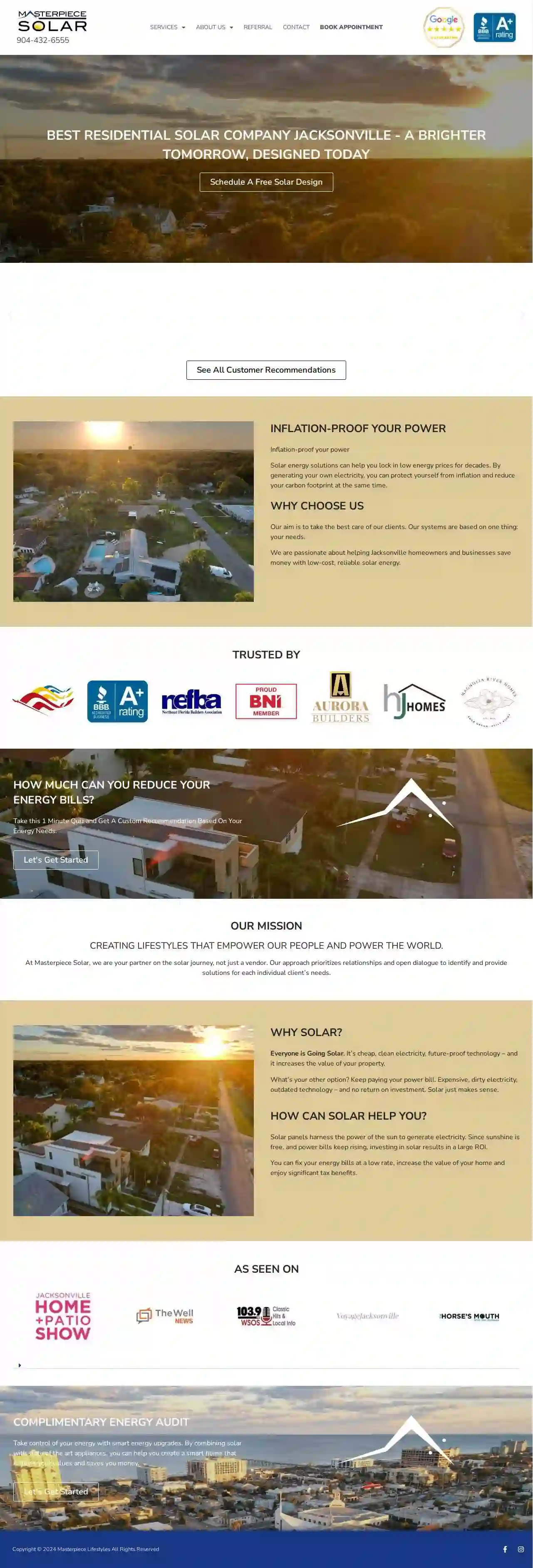
Masterpiece Solar
532 reviews123 Solar Lane, Jacksonville, 32207, USMasterpiece Solar is Jacksonville's premier destination for residential solar solutions. We are dedicated to empowering homeowners with the benefits of solar energy. Our commitment is to provide high-quality solar projects and to utilize our partners to expertly install solar panels, making solar power Jacksonville accessible for all.
- Services
- Why Us?
- Accreditations
- Our Team
- Testimonials
- Gallery
Get Quote
Southeast SolarPros
530 reviewsSoutheast SolarPros, 123 Solar Lane, Irmo, SC, 29063, USSoutheast SolarPros is a professional solar panel company serving homeowners and businesses in the Carolinas. We pride ourselves in our high quality, engineered solar energy systems and solar panel installations. Go green with our sustainable energy solutions today.
- Services
- Why Us?
- Accreditations
- Our Team
- Testimonials
- Gallery
Get Quote
National Renewable Energy Corporation (NARENCO)
48 reviewsSuite A, 801 Wood Ridge Center Drive, Charlotte, 28217, USNARENCO is a leading solar company focused on developing, building, and operating utility-scale solar installations. Founded in 2009, the company has successfully partnered with leading investors and clients on groundbreaking projects. NARENCO's mission is to create long-term partnerships based on integrity, credibility, and reliability. The company's vertical integration ensures seamless management through every stage of the project lifecycle, from design to construction to operations and maintenance. NARENCO consistently delivers high-quality solar installations that revolutionize the energy market.
- Services
- Why Us?
- Accreditations
- Gallery
Get Quote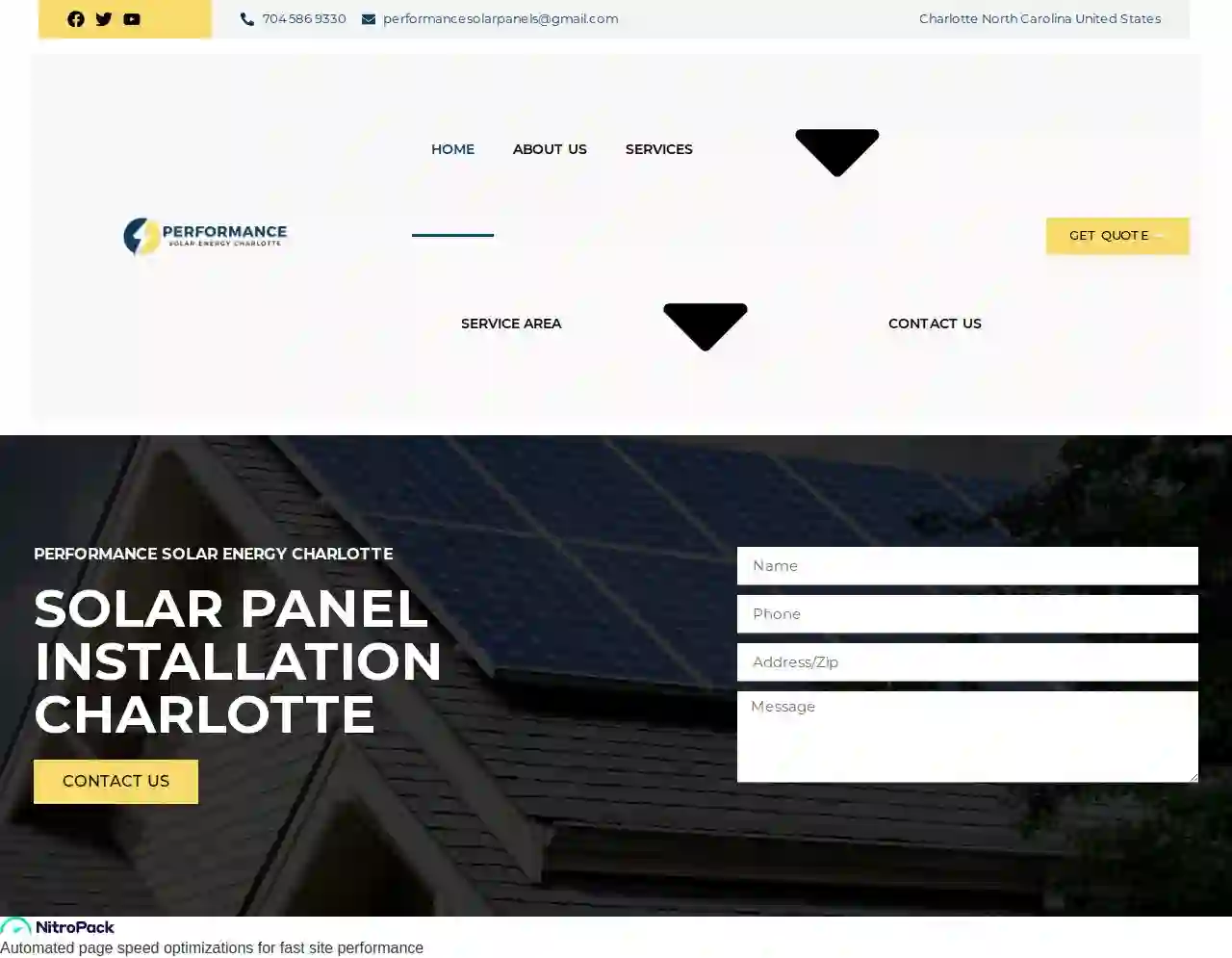
Performance Solar Energy Charlotte
59 reviewsPerformance Solar Energy, Charlotte, NC, 123 Solar Street, 28205, USPerformance Solar Energy Charlotte is a leading solar energy company in Charlotte, providing a wide range of solar energy services including solar panel installation, solar panel maintenance, and solar panel repair. With years of experience in the solar industry, our team of skilled professionals is dedicated to delivering the highest quality solar energy services to our customers. We offer a free consultation to assess your energy needs and provide a detailed proposal outlining our services. We believe solar power is the future of energy production and are committed to helping our customers save money and reduce their carbon footprint.
- Services
- Why Us?
- Accreditations
- Our Team
- Testimonials
- Gallery
Get Quote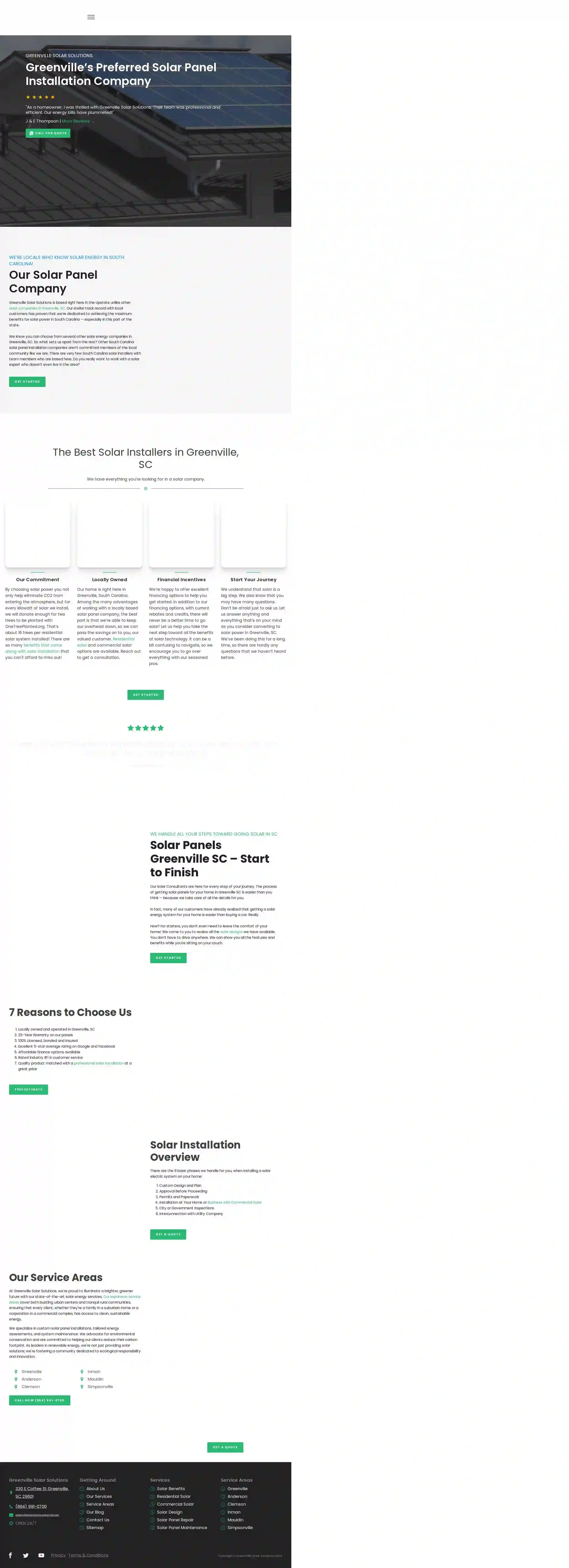
Greenville Solar Solutions
11 reviewsGreenville, SC, 123 Solar Way, 29601, USGreenville Solar Solutions is a leading provider of solar solutions in Greenville, SC. Our mission is to provide sustainable energy solutions to residential and commercial clients. We offer a range of services including solar design, installation, repair, and maintenance. Our team of experts is dedicated to delivering high-quality services and ensuring customer satisfaction.
- Services
- Why Us?
- Accreditations
- Our Team
- Testimonials
- Gallery
Get Quote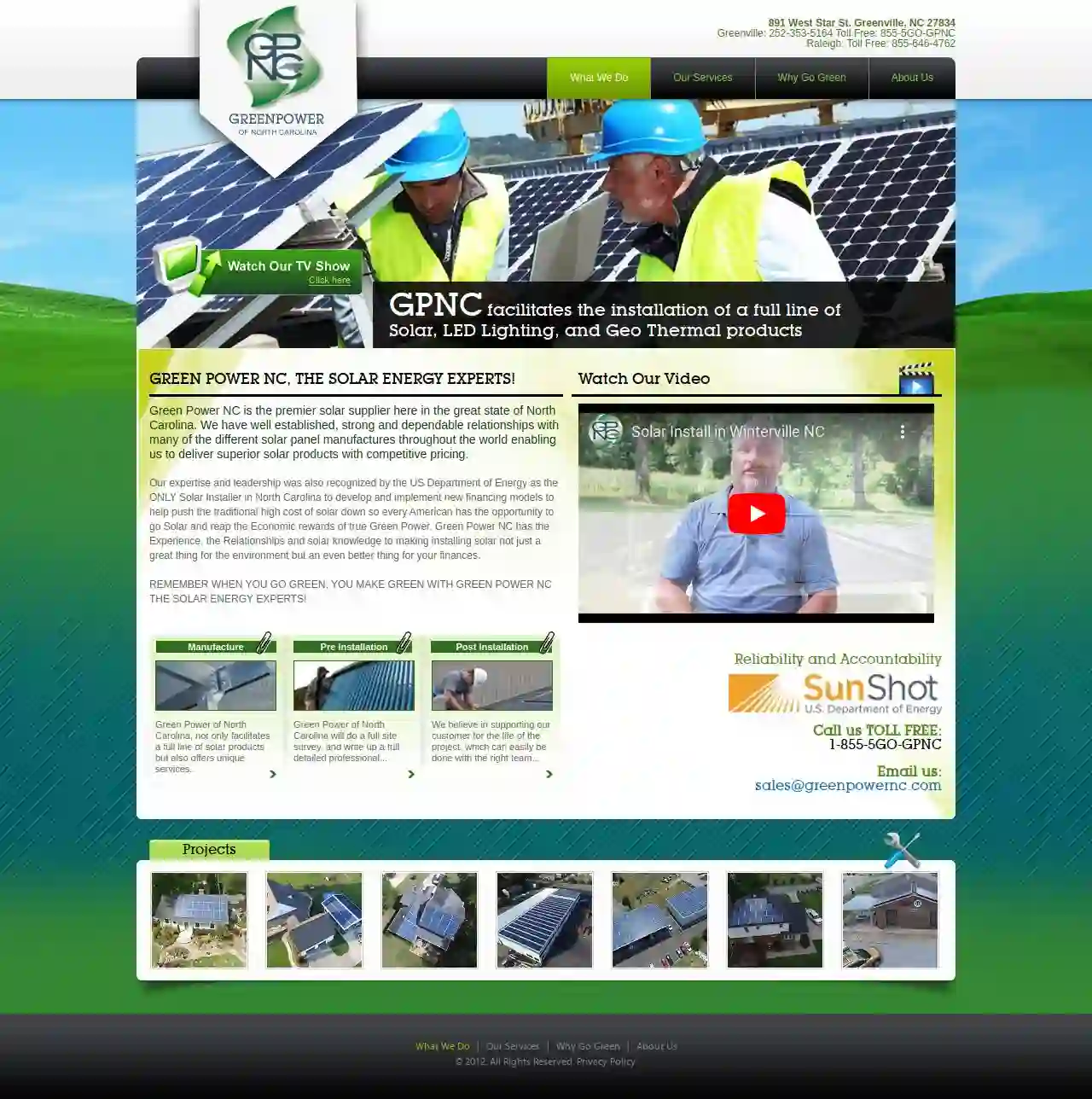
Green Power of North Carolina
51 reviews891 West Star St., Greenville, 27834, USGreen Power NC is the premier solar supplier in North Carolina, with established relationships with solar panel manufacturers worldwide. They offer competitive pricing and superior solar products. Their expertise and leadership were recognized by the US Department of Energy for developing and implementing new financing models to make solar energy more affordable. They have a diverse, highly educated, and professional team with over 40 years of experience in solar and renewable energy, construction management, and business technology fields. They support US Military Veterans and their families and have dedicated team members from the Army, Air Force, Navy, and Marine Corps.
- Services
- Why Us?
- Accreditations
- Our Team
- Gallery
Get Quote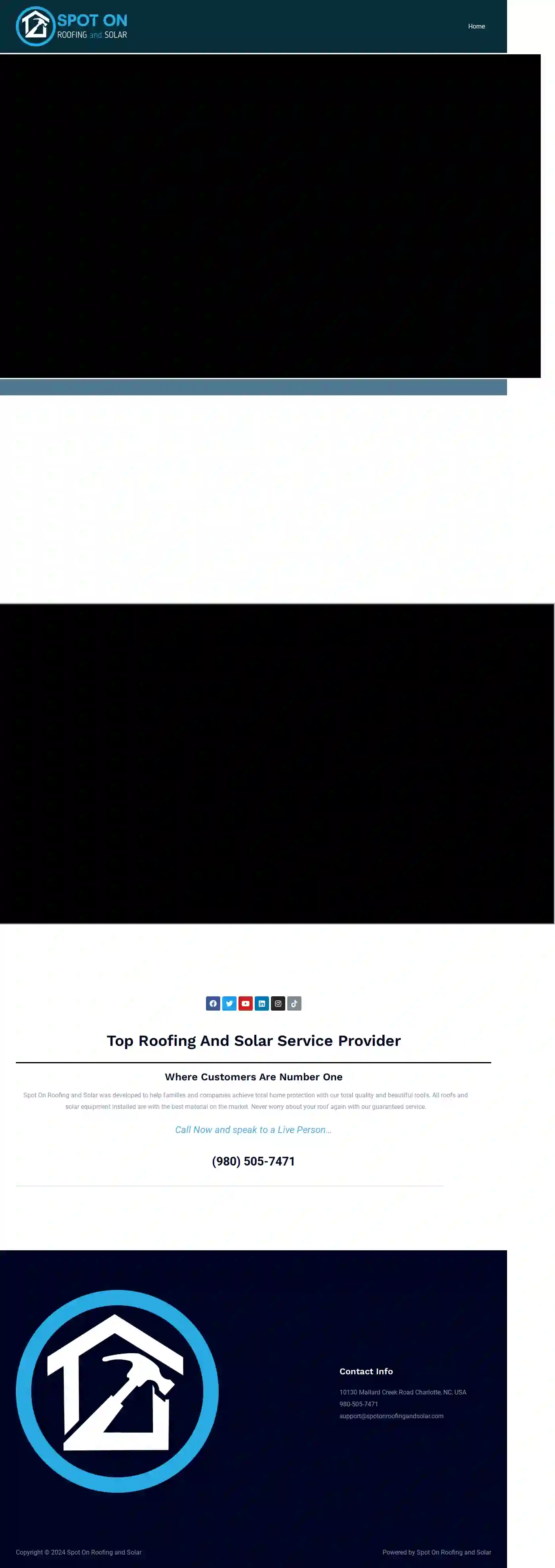
Spot On Roofing and Solar
514 reviews10130 Mallard Creek Road, Charlotte, NC, USA, 28262, USSpot On Roofing and Solar was developed to help families and companies achieve total home protection with our total quality and beautiful roofs. All roofs and solar equipment installed are with the best material on the market. Never worry about your roof again with our guaranteed service.
- Services
- Why Us?
- Accreditations
- Our Team
- Testimonials
- Gallery
Get Quote
SolFarm Solar Co.
4.843 reviewsArden, NC, USA, 739 Glenn Bridge Rd, Asheville, 28704, USSolfarm Solar Co. is a passionate solar expert based in Asheville, NC. They offer a range of services including residential solar, commercial solar, battery backup power, and more. Their team is dedicated to helping clients achieve sustainability goals and reduce their carbon footprint.
- Services
- Why Us?
- Accreditations
- Our Team
- Testimonials
- Gallery
Get Quote
Solarflare Energy Company
53 reviewsFort Mill, SC, 123 Solar Lane, 29708, USSolarflare Energy Company is a leading provider of solar energy solutions, offering a range of services to help homeowners and businesses transition to renewable energy. With a commitment to sustainability and customer satisfaction, Solarflare provides comprehensive solar solutions, including solar panel installation, solar energy consulting, and solar system maintenance. Their team of experienced professionals ensures that clients receive personalized service and tailored solutions to meet their energy needs. Solarflare also offers educational resources and workshops to help customers understand the benefits of solar energy and how to maximize their savings.
- Services
- Why Us?
- Accreditations
- Our Team
- Testimonials
- Gallery
Get Quote
Over 4,210+ Solar Installers on our directory
Our solar pros operate in High Point and surroundings!
SolarCompaniesHub has curated and vetted the Best Solar Businesses in High Point. Find a trustworthy contractor today.
Frequently Asked Questions About Solar Installers
- Tax Credits: Reduce your income tax liability based on the cost of your solar system.
- Rebates: Direct cash payments or discounts on the purchase of a solar energy system.
- Net Metering: Allows you to sell excess solar electricity back to the grid for credits.
- Renewable Energy Certificates (RECs): Tradeable credits representing the environmental attributes of your solar energy generation.
- Cash Purchase: The most straightforward option, providing the greatest long-term savings but requiring a larger upfront investment.
- Solar Loans: Loans specifically designed for solar installations, often with favorable terms and interest rates.
- Solar Leases: A third-party company owns the system and leases it to you, allowing you to go solar with little or no upfront cost, but you won't own the system or receive tax benefits.
- Power Purchase Agreements (PPAs): Similar to leases, but you pay for the electricity generated by the system, not the system itself.
- Home Equity Loans or Lines of Credit: Borrow against the equity in your home.
Do solar panels increase my home value?
Are there any financial incentives for going solar?
Do I need planning permission to install solar panels in USA?
How can I finance my solar panel installation?
Do solar panels increase my home value?
Are there any financial incentives for going solar?
- Tax Credits: Reduce your income tax liability based on the cost of your solar system.
- Rebates: Direct cash payments or discounts on the purchase of a solar energy system.
- Net Metering: Allows you to sell excess solar electricity back to the grid for credits.
- Renewable Energy Certificates (RECs): Tradeable credits representing the environmental attributes of your solar energy generation.
Do I need planning permission to install solar panels in USA?
How can I finance my solar panel installation?
- Cash Purchase: The most straightforward option, providing the greatest long-term savings but requiring a larger upfront investment.
- Solar Loans: Loans specifically designed for solar installations, often with favorable terms and interest rates.
- Solar Leases: A third-party company owns the system and leases it to you, allowing you to go solar with little or no upfront cost, but you won't own the system or receive tax benefits.
- Power Purchase Agreements (PPAs): Similar to leases, but you pay for the electricity generated by the system, not the system itself.
- Home Equity Loans or Lines of Credit: Borrow against the equity in your home.